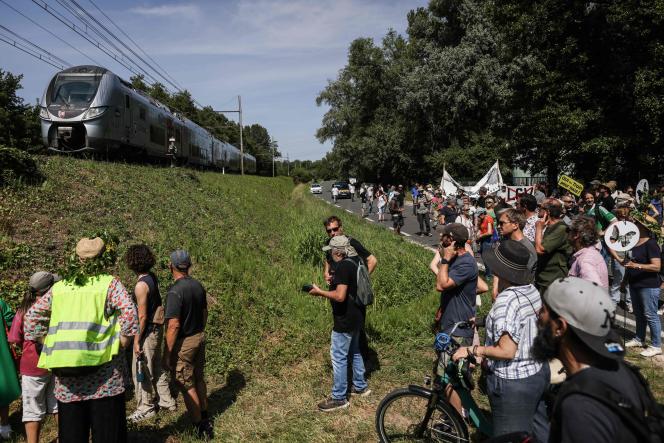Some 400 demonstrators gathered on Saturday June 3 in Gironde against the future Bordeaux-Toulouse and Bordeaux-Dax high-speed rail line (LGV), the first works of which are expected at the end of 2023, warning that opposition to the project risked “to harden”. At the request of the LGVEA association and the LGV-NiNa (“LGV Ni ici ni elsewhere”) and Stop-LGV Bordeaux Métropole collectives, a “naturalist walk” was organized at midday to visualize the right-of-way of the future line in Saint-Médard-d’Eyrans, about fifteen kilometers south of Bordeaux. “We will oppose it. The Ciron valley, we are going to defend it and it will get tougher”declared Richard Lavin, member of the LGV-NiNa collective, in the presence of several parliamentarians and elected officials.
This Grand Projet du Sud-Ouest (GPSO), in the pipeline since 1991 and relaunched in recent years, aims to connect, in 2032, Toulouse to Paris in 3 h 10 and to Bordeaux in 1 h 05, saving one hour on the current route. Five years later, according to the presidency of the GPSO, a section borrowing the east of the Landes forest should connect Dax to Bordeaux in twenty minutes less than the existing route. In April, the prefect of Occitanie Pierre-André Durand, who is also coordinator of the GPSO, confirmed on France Bleu that the commissioning of the Bordeaux-Toulouse high-speed line was still scheduled for 2032 and that the construction site would start “in principle at the end of the year”.
“It’s the right timing”
The president of New Aquitaine Alain Rousset (Socialist Party) and his other supporters defend a project ” Green “ which would allow ” to go out “ of the road the 10,000 trucks that go up every day from Spain, freeing up the existing lines for freight.
But opponents denounce a “deadly project” which, according to them, would lead to the artificialization of 5,000 hectares, notably crossing the Ciron valley, a tributary of the Garonne, where there is an ancestral beech forest. “We cannot smash the Aquitaine basin when we see the crises [de sécheresse] that we have “Pauline Dupouy, spokeswoman for LGV-NiNa, told Agence France-Presse. “It’s the right timing to react, it’s not too late, the work has not started. »
Opponents also criticize the imposition of a special equipment tax (TSE) on 2,000 municipalities close to the route to finance a “pharaonic site” valued at 14 billion euros. This envelope must be borne 40% by the State, 40% by the communities and 20% by the European Union.
